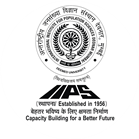- About IIPS
- Academics
- Study @ IIPS
- Departments
- Centres
- Controller of Examination
- Programme
- Distance and Online Education
- Training
- Facilities/Services
- Resources
- Virtual Learning
- Digital Initiatives (MHRD)
- Notice
- Seminars / Workshops / Conferences
- Conferences
- Publications
- Seminars
- Sponsored Research
- Workshops
- Collaboration
- National
- International
- NEP 2020
- Admission
- Courses
- Admission Bulletin
- TIME-TABLE For Admission 2025-26
- Model Question Papers
- Programme Coordinators
- Fellowships
- Academic Calendar
- International Students
- Visa Information
- Administration
- Faculty & Staff
- Research & Publications
- Library
- Information
- Right to Information
- Vigilance Officer
- Annual Report
- Director's Report
- Cells & Commitees
- Cells
- Commitees
- Committees of NEP 2020
- Staff Walfare Committee
- Cultural Committee
- Internal Committee
- Purchase Commitees
- Students Academic Committee
- Student Research Ethics Committee
- Anti-Ragging Committee
- Institutional Review Board
- Social Media Committee
- Prevention of Caste-based Discrimination Committee
- Code of Conduct and Professional Ethics
- National and International honours, Awards, Recognition, and Medals
- Online Facilities
- Employee's Corner
- Memorial Lectures
- Convocation
- IIPS Newsletters
- COVID 19 Information
- Life @ IIPS
SUCCESSFUL AGEING: a multidisciplinary approach to thriving through longer lives
- Home
- SUCCESSFUL AGEING: a multidisciplinary approach to thriving through longer lives
Abstract Content (not more than 300 word, should include: Introduction, Objective, Methodology, critical findings & Conclusion):
Introduction: Life expectancy in India has steadily increased, from 63.5 years in 2005 to 69.7 years in 2019, with projections reaching 76.7 years by 2050. Alongside, societal, familial and workplace parameters have also undergone significant transformations.
Objectives: The objective of our study is to understand what influences “successful ageing” and thriving in the later decades of life.
Data and Methods: We used a mixed-methods approach, combining published quantitative data with primary qualitative data. The quantitative data were sourced from the UNESCO’s Global Reports on Adult Learning and Education (GRALE) and the Longitudinal Ageing Study in India (LASI). Complementing this, as students of Gerontology, qualitative data were gathered through in-depth case studies interviews with older adults and their caregivers to provide a deeper understanding of the lived experiences and contextual factors influencing aging.
Findings: As per LASI data, 41% of men and 57% of women aged 60+ reported having at least one chronic condition. In terms of mental health, 25% of men and 30% of women aged 60+ were found to have symptoms of depression. On financial parameters, less than 10% receive pension in / beyond their 7th decade. Socially, about 10-12% of individuals aged 60+ lived alone. UNESCO’s GRALE reports emphasize the need for increased engagement to enhance quality of life and on the importance of robust policies, interventions and adequate financing. A series of in depth interviews with a small sample size dives deeper into specific nuances of middle-class older adults in urban areas.
Conclusion: To mainstream older adults in the workforce, social setting and familial dynamics, multiple stakeholders need to come together and provide a new framework for aging. For older adults to thrive through these additional decades, a holistic, multidimensional lens would be applicable and interventions, policies and environment to nurture the same are required.
Abstract theme:
In case of not been selected for oral presentation, do you want to be considered for the poster presentation ?:
Yes
Do you require financial support to attend the seminar ? (Not applicable for virtual meet):
No.
Gender:
Female
Evaluation Status:
No
